Related Research Articles
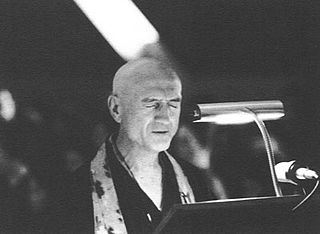
Philip Kapleau was an American teacher of Zen Buddhism in the Sanbo Kyodan tradition, a blending of Japanese Sōtō and Rinzai schools. He also advocated strongly for Buddhist vegetarianism.

Stephen Batchelor is a Scottish Buddhist author and teacher, writing books and articles on Buddhist topics and leading meditation retreats throughout the world. He is a noted proponent of agnostic or secular Buddhism.
Kyozan Joshu Sasaki, Roshi was a Japanese Rinzai Zen teacher who sought to tailor his teachings to westerners, he lived in Los Angeles, United States. Joshu Sasaki opened dozens of centres and was founder and head abbot of the Mount Baldy Zen Center, near Mount Baldy in California, and of the Rinzai-Ji order of affiliated Zen centers. He was one of the most influential Zen masters in America.

The term American Buddhism can be used to describe all Buddhist groups within the United States, including Asian-American Buddhists born into the faith, who comprise the largest percentage of Buddhists in the country.

Dennis Merzel is an American Zen and spirituality teacher, also known as Genpo Merzel.

Eido Tai Shimano was a Rinzai Zen Buddhist roshi. He was the founding abbot of the New York Zendo Shobo-Ji in Manhattan and Dai Bosatsu Zendo Kongo-Ji monastery in the Catskill mountains of New York; he was forced to resign from that position of 40 years after revelations of a series of sexual relationships with and alleged sexual harassment of female students. This case was never brought to court and Shimano never admitted any wrong doing.

Eijun Linda Cutts is a Sōtō Zen priest practicing in the lineage of Shunryu Suzuki, a Senior Dharma Teacher at the San Francisco Zen Center. Cutts is a Dharma heir of Tenshin Reb Anderson, having received Dharma transmission from him in 1996. She served as co-abbess of the San Francisco Zen Center from 2000 to 2007, and had first begun practice at the San Francisco Zen Center in 1971; later, she was ordained a priest by Zentatsu Richard Baker in 1975. Currently living at Green Gulch Farm Zen Center, as abbess she had been aware of the significance in being a woman in a leadership position in religion that has historically been a patriarchy. In this vein, within her first year as abbess she instituted the ceremony in which female ancestors could be honored. She became Central Abbess of San Francisco Zen Center in 2014.

Sokei-an Shigetsu Sasaki, born Yeita Sasaki, was a Japanese Rinzai monk who founded the Buddhist Society of America in New York City in 1930. Influential in the growth of Zen Buddhism in the United States, Sokei-an was one of the first Japanese masters to live and teach in America. In 1944 he married American Ruth Fuller Everett. He died in May 1945 without leaving behind a Dharma heir. One of his better known students was Alan Watts, who studied under him briefly. Watts was a student of Sokei-an in the late 1930s.
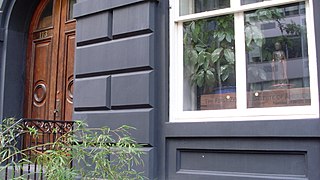
The First Zen Institute of America is a Rinzai institution for laypeople established by Sokei-an in New York, New York in 1930 as the Buddhist Society of America. The emphasis on lay practice has its roots in the history of the organization. In 1875, the Japanese Rinzai Zen master Imakita Kosen founded a Zen institute, Ryomokyo-kai, dedicated to reviving Zen in Japan by recruiting talented and educated lay people. Kosen's most celebrated disciple, Soyen Shaku, visited America in 1893 to attend the World's Parliament of Religions in Chicago. In 1902 he returned to America where he lectured and taught briefly. Soyen Shaku assigned responsibility for this lay Zen institute to his heir, Sokatsu Shaku. The First Zen Institute's founder, Sokei-an, was Sokatsu's student and came to America with him in 1906 to establish a Zen community. When Sokatsu returned to Japan in 1910, Sokei-an remained to season his Zen and familiarize himself with the American character. After wandering across America and perfecting his English, Sokei-an made several trips back to Japan and in 1924 received credentials from Sokatsu as a Zen master.
Ryōmō Kyōkai (両忘協会 "Ryōmō Society", was a lay Rinzai Zen Buddhist Dharma center located in Tokyo, Japan.
Martine Batchelor, a former Jogye Buddhist nun, is the author of several books on Buddhism currently residing in France. She and her husband, Stephen Batchelor, work mostly in the United Kingdom and occasionally in the United States. In addition to writing books, she leads meditation groups with her husband that incorporate aspects of Zen, vipassanā, and Tibetan Buddhism. Batchelor also blogs frequently for the U.S.-based Tricycle: The Buddhist Review. She studied Jogye Zen Buddhism for ten years at Songgwangsa with her former teacher Master Kusan Sunim, being ordained as a nun in 1975. Batchelor served as Kusan's interpreter on speaking tours of the United States and Europe from 1981 to 1985, the year she left monastic life, married Stephen Batchelor, and returned to Europe. There she became a member of Sharpham North Community and served as a guiding teacher at Gaia House, both of which are based in Devon, England. She has also led a Buddhist studies program at Sharpham College in Totnes, Devon. MB speaks English, Korean, and French and can read Chinese characters.

Hakuryu Sojun Mel Weitsman, born Mel Weitsman, was an American Buddhist who was the founder, abbot and guiding teacher of Berkeley Zen Center located in Berkeley, California. Weitsman was a Soto Zen roshi practicing in the lineage of Shunryu Suzuki, having received Dharma transmission in 1984 from Suzuki's son Hoitsu. He was also a co-abbot of the San Francisco Zen Center, where he served from 1988 to 1997. Weitsman was also editor of the book Branching Streams Flow in the Darkness: Zen Talks on the Sandokai, based on talks given by Suzuki on the Sandokai.
Shinge-shitsu Roko Sherry Chayat is the current abbot of the Zen Studies Society, based at the International Dai Bosatsu Zendo Kongo-ji monastery, outside Livingston Manor, NY, and at the New York Zendo Shobo-Ji on the Upper east Side of Manhattan. She is also the abbot of the Zen Center of Syracuse Hoen-ji. Chayat is an advocate for the use of meditation in medical settings, with Hoen-ji running the program Well/Being Contemplative Practices for Healing for healthcare professionals.
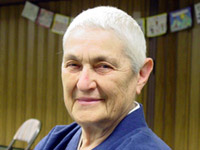
Zenkei Blanche Hartman was a Soto Zen teacher practicing in the lineage of Shunryu Suzuki. From 1996 to 2002 she served two terms as co-abbess of the San Francisco Zen Center. She was the first woman to assume such a leadership position at the center. A member of the American Zen Teachers Association, Blanche was especially known for her expertise in the ancient ritual of sewing a kesa. Hartman became known for her attention to issues women face; she and her late husband Lou Hartman had four children, eight grandchildren, and a number of great-grandchildren.

Enkyō Pat O'Hara is a Soto priest and teacher in the Harada-Yasutani lineage of Zen Buddhism.

Maylie Scott, Buddhist name Kushin Seisho, was a Sōtō roshi who received Dharma transmission from Sojun Mel Weitsman in 1998 at Tassajara Zen Mountain Center. She graduated from Harvard University in 1956 and obtained a master's degree in social work from the University of California, Berkeley. According to the book The Encyclopedia of Women and Religion in North America, "Maylie Scott described her primary teaching objective as empowering the sangha by making sure she is the facilitator, not the 'star.'" In addition to her occupation as a social worker, she was also on the Board of Directors for the Buddhist Peace Fellowship (BPF). In addition to serving for the BPF, Scott was also involved with the Buddhist Alliance for Social Engagement and frequently protested the import of weapons at the Concord Naval Weapons Station. A socially engaged Buddhist and teacher at the Berkeley Zen Center, Scott was known for her work in prisons and homeless shelters. Also, during the 1980s she studied under Maurine Stuart and, in April 2000, she founded Rin Shin-ji in Arcata, California. Professor Lloyd Fulton, of Humboldt State University, had once said of Scott that she is, "a strong-willed and organized woman."
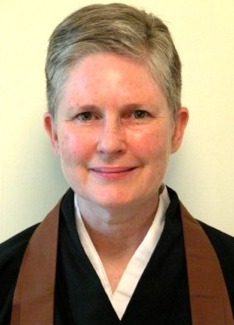
Josho Pat Phelan, Buddhist name Taitaku Josho, is a Sōtō Zen priest and current abbot of Chapel Hill Zen Center in Chapel Hill, North Carolina—she has served as abbot there since 2000. Before coming to Chapel Hill, she practiced for twenty years at Tassajara Zen Mountain Center and the San Francisco Zen Center. Phelan began leading the Chapel Hill Zen Center in 1991, when there were just eight members including herself. As of 2001, the center had forty-five members and provides meditation instruction for approximately one-hundred and fifty people every year. Ordained as a priest by Zentatsu Richard Baker in 1977, she began Zen practice in 1969 and has also trained under Sojun Mel Weitsman, Robert Baker Aitken and Tenshin Reb Anderson Additionally, Phelan is a member of the American Zen Teachers Association, and in 1995 she received shiho from Sojun Weitsman at Tassajara.
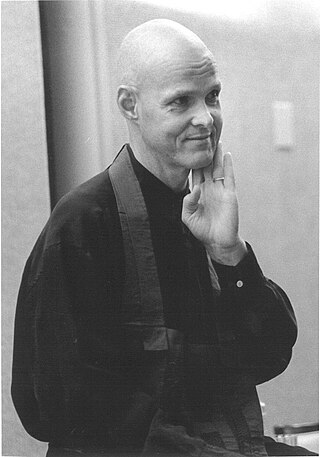
Tenshin Zenki Reb Anderson is an American Buddhist who is a Zen teacher in the Sōtō Zen tradition of Shunryu Suzuki. He is a Senior Dharma teacher at the San Francisco Zen Center and at Green Gulch Farm Zen Center in Marin County, California, where he lives. According to author James Ishmael Ford, "Reb Anderson is one of the most prominent of contemporary Western Zen teachers."
Tetsuo Sōkatsu (1870–1954) was a Japanese Rinzai-master. He was a dharma heir of Soyen Shaku.
Zen was introduced in the United States at the end of the 19th century by Japanese teachers who went to America to serve groups of Japanese immigrants and become acquainted with the American culture. After World War II, interest from non-Asian Americans grew rapidly. This resulted in the commencement of an indigenous American Zen tradition which also influences the larger western (Zen) world.
References
- "IN TRANSITION: MARY FARKAS (1911 - 1992)". Tricycle: The Buddhist Review. Fall 1992. Retrieved 22 September 2019.
- Skinner Keller, Rosemary; Rosemary Radford Ruether; Marie Cantlon (2006). The Encyclopedia of Women and Religion in North America. Indiana University Press. ISBN 0-253-34685-1. OCLC 61711172.
- Stirling, Isabel. Zen Pioneer: The Life & Works of Ruth Fuller Sasaki (2006) Shoemaker & Hoard. ISBN 978-1-59376-110-3